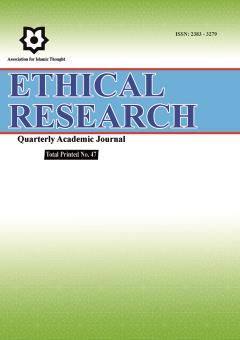Ethical examples of socializing the famous in the relationship between spouses and their role in strengthening the family from the perspective of the Holy Quran
Subject Areas : Ethics and Islamic Education
1 - Allameh Tabataba’I University
Keywords: Fellowship with the famous, moral examples, family consolidation, family, Quran. ,
Abstract :
In the Holy Qur'an, the most basic principle in behaviour and interaction between couples is mentioned as " Consorting with them in an honourable and right manner". In other words, the Holy Qur'an mentions the criterion of association with one's spouse as the " Maruf" principle. The Qur'anic phrase , in the relations between couples has a wide meaning and many examples, which in a general division is divided into two parts, examples with a jurisprudential nature and examples with a moral nature. The present study intends to examine the functions and role of this Quartic phrase according to its moral nature in the relationship between couples. The moral instances of " Consorting with them in an honourable and right manner " are generally divided into common instances between the couple and specific instances of each. Love, patience and mutual support of couples to each other are the most important moral examples of this rule. Love is a factor that prevents the collapse of the family and the tolerance and mutual support of couples to each other is a factor to create intimacy and peace between couples, which therefore play a key role in family stability. In this regard, benevolence, counselling and caring for the wife are considered moral examples specific to the man, and obedience, humility and protection of the husband's secrets and property in his absence are specific examples for the woman under this rule.
قرآن کریم، ترجمه مکارم شیرازی
نهج البلاغه، ترجمه دشتی، قم، مؤسسه فرهنگی تحقیقاتی أمیرالمؤمنین،
ابن بابویه (صدوق)، محمد بن علی(1398ق)، التوحید، مصحح: حسینی، هاشم، قم، جامعه مدرسین
ابن منظور، محمدبن مکرم(1414)، لسان العرب، بیروت، دار صادر
حرعاملی، محمدبن حسن(1409ق)، وسائل الشیعه، قم، مؤسسه آل¬البیت،
جوادی آملی،عبدالله(1391)،تسنیم، انتشارات اسراء،چاپ پنجم، قم،
جوهرى، اسماعيل بن حماد(1407ه)، صحاح اللغة، تحقيق احمدبن عبدالغفورعطّار، دارالعلم للملايين، چاپ چهارم،
راغب اصفهانی(بی تا)،مفردات الفاظ القرآن،تهران،مؤسسه اسماعیلیان،
رشیدرضا، محمد، (1995م)، تفسیر القرآن الکریم (التفسیر المنار)، بیروت، دارالمعرفه
سیوطی، جلال الدین(1404ق)، الدررالمنثورفی تفسیر المأثور، قم ،کتابخانه آیت الله مرعشی نجفی
شریفی، عنایت، درسنامه اخلاق خانواده ،تهران ،انتشارات دانشگاه علامه طباطبایی
طبایی، سیدمحمدحسین، (1407)، المیزان فی تفسیرالقرآن، قم، جامعه مدرسین حوزه علمیه قم
طبرسی، حسن بن الفضل(1392ق)، مكارم الاخلاق، بیروت، مؤسسه الاعلمی،
طریحی، فخرالدین(1362)، مجمع البحرین، تهران،المکتبة المرتضویه،
طوسی ، محمدبن حسن(1409،التبیان، تحقیق احمد حبیب العاملی، دار احیاء التراث العربی، بیروت، 1409ق
عاملي، جعفر مرتضى(1424)، مقالات ودراسات، المركز الإسلامي للدراسات، اول، بی¬جا،
عروسي حويزي، عبد علي بن جمعه(1370)، تفسير نورالثقلين، قم،اسماعيليان
علاسوند، فریبا(1389)، مهارت های زندگی با رویکرد دینی، چاپ سوم ، قم، سروش هدایت،
فاضل لنکرانی، محمد(1418ق)، تفصیل الشریعة فی شرح تحریر الوسیلة (کتاب الحج)، دار التعارف للمطبوعات، دوم،
كلینی، محمدبن یعقوب، اصول کافی، تصحیح وتحقیق علی اکبرغفاری، تهران دارالکتب الاسلامیه ،1365ش
گنابادی، محمد سلطان(1407ق)، تفسیر بیان السعاده، بیروت، مؤسسه الأعلمی
مترجمان(1377ش)، ترجمه تفسیر جوامع الجامع، چاپ دوم، مشهد، پژوهش های اسلامی آستان قدس رضوی
مجلسی، محمدباقر(1403)، بحارالانوار، بیروت، مؤسسة الوفاء،
مطهری، مرتضی،(1375)،اخلاق جنسی ، چاپ دهم،تهران،صدرا
مسلم بن حجاج نیشابوری(1234)،الصحیح،استانبول، دار الطباعه العامری ،
مصطفوى، حسن(1368ش)، التحقيق في كلمات القرآن الكريم، وزارت فرهنگ و ارشاد اسلامي، تهران،
مکارم شیرازی و همکاران(1374ش)، تفسیرنمونه، تهران،دارالکتب اسلامیه
نراقی، احمد، معراج السعادة ،تهران، رشیدی،1361ش.

